JN0-347 Online Practice Questions and Answers
Referring to the exhibit, you want router A to have an EBGP peering with router C. They are both connected through router B, which does not have BGP running, and has static routes configured.
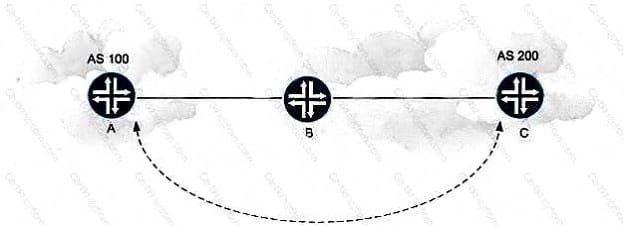
What must be configured in the EBGP peer groups on routers A and C to make this connection possible?
A. MED
B. multihop
C. multipath
D. next-hop
You are a service provider and have multiple customers in a building. You are installing a new switch that can host all of your customers. However, you would like to ensure that one customer cannot see or broadcast to another customer. You would also like to have them use a common gateway IP address from the building. What should be used to provide this access?
A. VLAN
B. private VLAN
C. filter-based VLAN
D. Layer 2 tunneling
Click the Exhibit button.
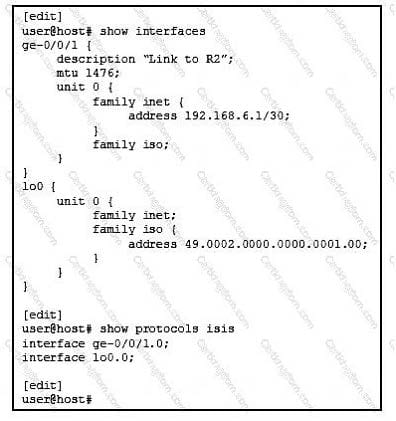
The IS-IS adjacency between routers R1 and R2 will not establish. Referring to exhibit, what is the problem?
A. The ISO address is not configured on interface ge-0/0/1.
B. The level is not configured under protocols isis.
C. The IP address is not configured on interface lo0.
D. The link MTU is too small on interface ge-0/0/1.
What information is included in the DHCP snooping database? (Choose two.)
A. client MAC address
B. DHCP server address
C. DHCP options
D. VLAN
Click the Exhibit button. Referring to the exhibit, which type of route is displayed?
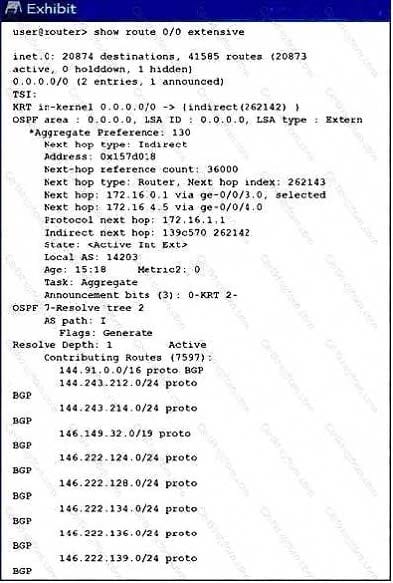
A. generate.
B. martian
C. aggregate
D. static
Click the Exhibit button. The exhibit shows that Host-1 and Host-2 are attached to the switch and
associated with IRB irb.1.
However, traffic sent from Host-1 to Host-2 is not blocked as expected. Why is this problem occurring?
A. Inter-VLAN traffic cannot be blocked by a router-based filter.
B. The block-host filter is applied in the wrong direction on theirb.1interface.
C. The Block-Host-2 term does not contain the MAC address of Host-2.
D. Intra-VLAN traffic cannot be blocked by a router-based filter.
Which three BGP attributes are well-known and mandatory? (Choose three.)
A. AS Path
B. Next Hop
C. MED
D. Local Preference
E. Origin
Click the Exhibit button. Referring to the exhibit, what does the asterisk (*) following the ge-0/0/5.0 interface indicate?
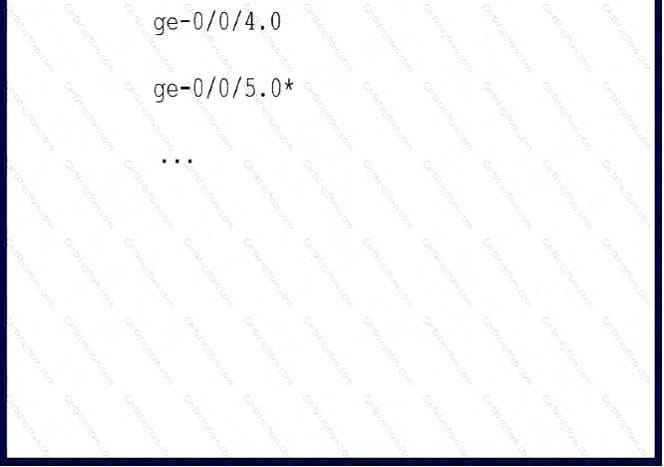
A. It indicates the interface is a trunk port.
B. It indicates the interface is not active.
C. It indicates the interface is an access port.
D. It indicates the interface is active.
What are three types of bridge protocol data units? (Choose three.)
A. media endpoint discovery
B. topology change acknowledgement
C. topology change notification
D. type length value
E. configuration
Click the Exhibit button.

You created a policy to reject all incoming routes from peer 2.2.2.2. You notice that despite applying the
policy, you are still receiving routes from this peer.
Referring to the exhibit, why are you still receiving the routes?
A. The policy should have a form statement.
B. You can only block active prefixes.
C. The policy should be an import policy.
D. You cannot block incoming IBGP routes.
Click the Exhibit button.

Referring to the exhibit, which two statements are true regarding IS-IS adjacencies? (Choose two.)
A. Level 1 adjacencies can be formed between Router 3 and Router 4.
B. Level 2 adjacencies can be formed between all routers.
C. Level 2 adjacencies can only be established between Router 1 and Router 2.
D. No IS-IS adjacencies can be formed.
Click the Exhibit button. Switch-1 in the exhibit receives a packet from User A with a destination MAC address of
00:26:88:02:74:48.
Which statement is correct?
A.
Switch-1 floods the packet out ge-0/0/6, ge-0/0/7, and ge-0/0/8.
B.
Switch-1 sends the packet out ge-0/0/7 only.
C.
Switch-1 sends the packet out ge-0/0/8 only.
D.
Switch-1 floods the packet out ge-0/0/7 and ge-0/0/8.
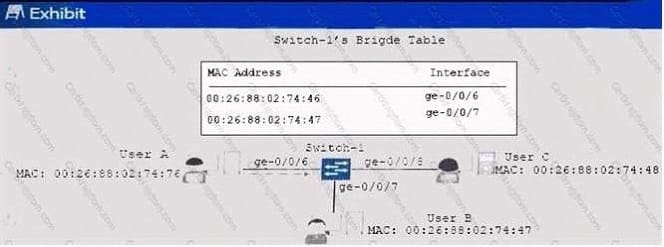
Click the Exhibit button. Referring to the exhibit, which policy will export routes to IBGP peers?
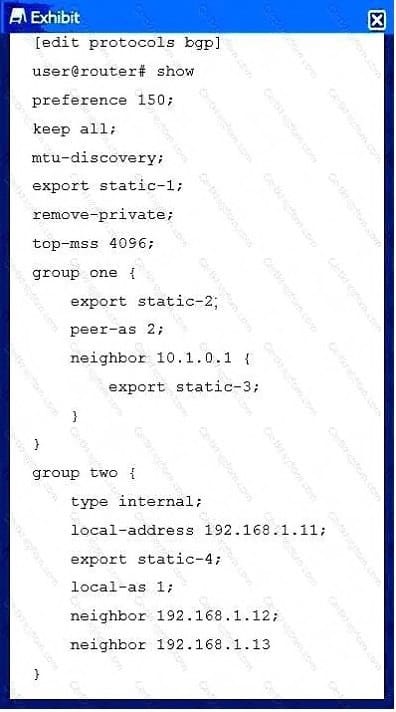
A. static-4
B. static-1
C. static-3
D. static-2
Which device is used to separate collision domains?
A. switch
B. router
C. hub
D. firewall
Referring to the exhibit, which three actions would summarize these routes to a BGP peer? (Choose three.)

A. Create a policy that accepts the more specific contributing routes.
B. Create a route to 10.200.16.0/21 with a next hop .16.36.1 under the [edit routing- options static] hierarchy.
C. Create a policy that rejects the more specific contributing routes.
D. Create a policy to accept aggregate routes.
E. Create a 10.200.16.0/22 route under the [edit routing-options aggregate] hierarchy.
